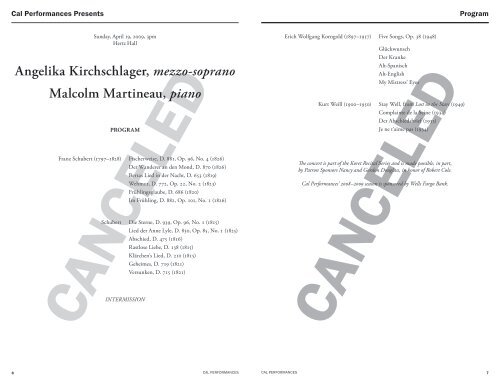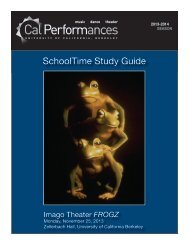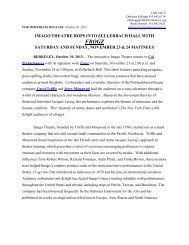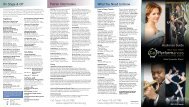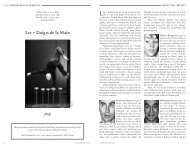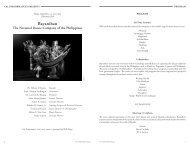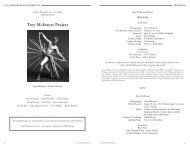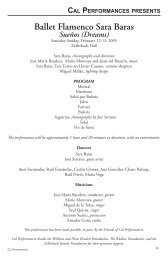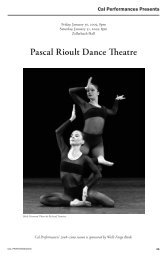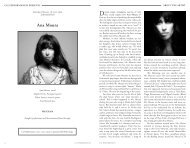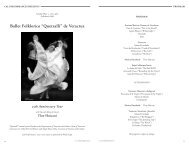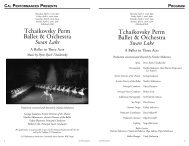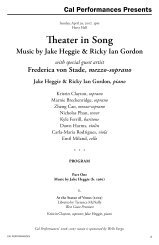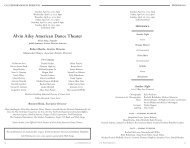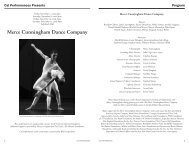Angelika Kirchschlager, mezzo-soprano ... - Cal Performances
Angelika Kirchschlager, mezzo-soprano ... - Cal Performances
Angelika Kirchschlager, mezzo-soprano ... - Cal Performances
You also want an ePaper? Increase the reach of your titles
YUMPU automatically turns print PDFs into web optimized ePapers that Google loves.
<strong>Cal</strong> <strong>Performances</strong> Presents<br />
6<br />
Sunday, April 19, 2009, 3pm<br />
Hertz Hall<br />
<strong>Angelika</strong> <strong>Kirchschlager</strong>, <strong>mezzo</strong>-<strong>soprano</strong><br />
Malcolm Martineau, piano<br />
PROGRAM<br />
Franz Schubert (1797–1828) Fischerweise, D. 881, Op. 96, No. 4 (1826)<br />
Der Wanderer an den Mond, D. 870 (1826)<br />
Bertas Lied in der Nacht, D. 653 (1819)<br />
Wehmut, D. 772, Op. 22, No. 2 (1823)<br />
Frühlingsglaube, D. 686 (1820)<br />
Im Frühling, D. 882, Op. 101, No. 1 (1826)<br />
Schubert Die Sterne, D. 939, Op. 96, No. 1 (1815)<br />
INTERMISSION<br />
Lied der Anne Lyle, D. 830, Op. 85, No. 1 (1825)<br />
Abschied, D. 475 (1816)<br />
Rastlose Liebe, D. 138 (1815)<br />
Klärchen’s Lied, D. 210 (1815)<br />
Geheimes, D. 719 (1821)<br />
Versunken, D. 715 (1821)<br />
CANCELED<br />
CAL PERFORMANCES<br />
CAL PERFORMANCES<br />
Erich Wolfgang Korngold (1897–1957) Five Songs, Op. 38 (1948)<br />
Glückwunsch<br />
Der Kranke<br />
Alt-Spanisch<br />
Alt-English<br />
My Mistress’ Eyes<br />
Kurt Weill (1900–1950) Stay Well, from Lost in the Stars (1949)<br />
Complainte de la Seine (1934)<br />
Der Abschiedsbrief (1933)<br />
Je ne t’aime pas (1934)<br />
The concert is part of the Koret Recital Series and is made possible, in part,<br />
by Patron Sponsors Nancy and Gordon Douglass, in honor of Robert Cole.<br />
<strong>Cal</strong> <strong>Performances</strong>’ 2008–2009 season is sponsored by Wells Fargo Bank.<br />
CANCELED CANCELED<br />
Program<br />
7
Program Notes<br />
Franz Schubert (1797–1828)<br />
Selected Songs<br />
In June 1816, when he was 19, Schubert received<br />
his first fee for one of his compositions (a now-lost<br />
cantata for the name-day of his teacher, Heinrich<br />
Watteroth), and decided that he had sufficient<br />
reason to leave his irksome teaching post at his<br />
father’s school in order to live the life of an artist.<br />
Thus began the bohemian existence of his last<br />
dozen years—living by the gladly proffered aid of<br />
friends, daily climbing up to Grinzing to haunt the<br />
cafés, avoiding the higher levels of society for dislike<br />
of buying and wearing good clothes. And music,<br />
always music. He composed incessantly. Out<br />
of bed shortly after dawn (sometimes he slept with<br />
his glasses on so as not to waste any time getting<br />
started in the morning), pouring out music until<br />
early afternoon, then off to who-knows-where for<br />
a bit too much Heuriger wine and a few pipes of<br />
cheap tobacco. Compositions filled his head all<br />
the while, sometimes scratched out on napkins<br />
or envelopes if they could not wait until the next<br />
morning. Evenings were spent making music with<br />
his devoted band of friends, who were delighted to<br />
sing and play what he wrote. Franz von Hartmann<br />
recorded of one of these Schubertiads, “There was<br />
a huge gathering [including] Gahy, who played<br />
four-hand piano music gloriously with Schubert,<br />
and Vogl, who sang almost thirty splendid songs....<br />
When the music was over, there was a grand feast<br />
and dancing. At 12:30 [we went] home. To bed at<br />
1 o’clock.” These convivial meetings were often<br />
hosted by prominent members of society, including<br />
lawyers and government officials, and were<br />
regularly attended by both professional musicians<br />
and amateurs.<br />
Schubert first met Franz Xaver von Schlechta<br />
when they were both students at the School of the<br />
Court Chapel in Vienna. Schlechta, the son of<br />
a military officer, went on to a distinguished career<br />
in public service that culminated in his being<br />
named Austria’s Finance Minister. He remained<br />
a friend and great admirer of the composer, took<br />
part in his Schubertiads, and offered him several<br />
of his own poems to be set to music. Fischerweise<br />
(“Fisherman’s Song”), composed in March 1826,<br />
8<br />
suggests both the vigorous activity and the deep<br />
contentment of the trade.<br />
Johann Gabriel Seidl (1804–1875), teacher,<br />
curator, lawyer, censor and prolific lyrical poet,<br />
had been a friend of Schubert since his youth. In<br />
1824, he tried to persuade Franz to use an opera<br />
libretto of his titled Der Kurze Mantel, but was<br />
refused. The first of Schubert’s settings of Seidl’s<br />
poems for solo voice was Der Wanderer an den<br />
Mond (“The Wanderer Addresses the Moon”) of<br />
March 1826, which was followed by ten others.<br />
Schubert presented Der Wanderer an den Mond<br />
at the Schubertiad of April 23, 1827 at the home<br />
of Joseph Witteczek, a devoted friend of his and<br />
a frequent host of the Schubertiads who amassed<br />
an important collection of Schubert’s first editions,<br />
manuscripts and press clippings. Schubert dedicated<br />
these two songs to Witteczek upon their publication<br />
by Tobias Haslinger the following year.<br />
By the time that Schubert met him, in early<br />
1819, Franz Grillparzer had become one of Austria’s<br />
most acclaimed playwrights largely through the<br />
success two years earlier of Die Ahnfrau (“The<br />
Ancestress”) at the Theater an der Wien. Composer<br />
and dramatist became friends. Grillparzer attended<br />
Schubert’s musical evenings, Schubert set three<br />
of his verses, and in 1828 Grillparzer devised the<br />
poignant motto for the composer’s tombstone:<br />
“Music has here entombed a rich treasure, but still<br />
fairer hopes.” The text for Bertas Lied in der Nacht<br />
(“Berta’s Song in the Night”), which Schubert set<br />
in February 1819, was taken from Die Ahnfrau, a<br />
tragedy about the workings of fate through an ancestral<br />
family ghost.<br />
Matthäus von Collin (1779–1824), brother of<br />
Heinrich Joseph von Collin (1771–1811), whose<br />
play Coriolan inspired one of Beethoven’s finest<br />
overtures, was a lawyer, editor, poet, dramatist<br />
and professor of aesthetics and philosophy at the<br />
University of Vienna who was so highly respected<br />
that he was entrusted with the education of<br />
Napoleon’s son, the Duke of Reichstadt. Schubert<br />
met Matthäus through Joseph von Spaun, a fellow<br />
student at the School of the Court Chapel<br />
in Vienna who became a lifelong friend and supporter.<br />
It was through his association with Collin<br />
that Schubert became known to many of the city’s<br />
CANCELED<br />
CAL PERFORMANCES<br />
fashionable music lovers, and, in appreciation,<br />
he set five of Collin’s poems, including Wehmut<br />
(“Sadness”) in 1823.<br />
Johann Ludwig Uhland (1787–1862), poet,<br />
playwright, essayist and folklorist, was one of the<br />
leading writers of Germany during Schubert’s day.<br />
Uhland was trained for a law career, and practiced<br />
that profession for a time before becoming<br />
Professor of German Literature at the University of<br />
Tübingen. Schubert set only one of Uhland’s poems,<br />
in 1820—Frühlingsglaube (“Faith in Spring,”<br />
D. 686)—but it is his most beautiful tribute to the<br />
vernal season.<br />
Ernst Konrad Friedrich Schulze lived, and made<br />
poetry, at the far edge of German Romanticism.<br />
Born in Celle in 1789 into a family of lawyers and<br />
booksellers, he was a difficult and uncommunicative<br />
child who retreated into literature and his own<br />
roiling feelings, which he began to shape into despairing,<br />
spectral, often cynical poems by the age<br />
of 15. His sexual awakening two years later, when<br />
he went to Göttingen to begin his university studies,<br />
led to an obsessive attention—“stalking,” Susan<br />
Youens called it in her study of Schubert’s Poets—<br />
toward two sisters: first Cäcilie Tychsen, and, after<br />
she died of tuberculosis in 1812, her older sister,<br />
Adelheid. Schulze volunteered to fight against<br />
Napoleon in 1814, but his fragile health quickly<br />
forced him out of active duty. He died of tuberculosis<br />
in 1817; he was 28. Schulze recorded his intense<br />
feelings in enormous diaries and long poems<br />
throughout his brief life, a number of which were<br />
published posthumously in 1822 as the Poetisches<br />
Tagebuch (“Poetic Diary”). Schubert came to know<br />
this publication early in 1825—he had considered<br />
making an opera of Schulze’s Die Bezauberte<br />
Rose (“The Enchanted Rose”) the year before, but<br />
nothing came of the idea—and he set ten of the<br />
poems during the following months. Schulze expressed<br />
his unrequited love for the Tychsen sisters<br />
in the German Romanticists’ traditional natural<br />
metaphors in Im Frühling (“In Spring”), of which<br />
Schubert made a poignant setting in 1826.<br />
Teacher, poet, editor, librarian, historian, lecturer<br />
and curator Karl Gottfried von Leitner (1800–<br />
1890) was one of the leading figures in the cultural<br />
life of his native Styria. Schubert was introduced to<br />
Program Notes<br />
his verses when Johann Schickh published some of<br />
them in his Zeitschrift für Kunst, Literatur, Theater<br />
und Mode (“Journal for Art, Literature, Theater and<br />
Fashion”) in 1822; Schubert set Leitner’s Drang<br />
in die Ferne (“Distant Urge”) early the following<br />
year. On a stay in Graz in September 1827 with his<br />
musical friends Karl and Marie Pachler, Schubert<br />
became acquainted with Leitner’s recent work, and<br />
during the following year he set ten more of his<br />
poems, including the delightful astronomical encomium,<br />
Die Sterne (“The Stars”).<br />
Andrew MacDonald (1757–1790) was called<br />
as a young man to the ministry in the Scottish<br />
Episcopal Church, but the heavy proscription on<br />
that sect following its support of the Jacobite uprisings<br />
to return the Catholic Stuart line to the<br />
throne of Great Britain drove him into penury.<br />
He took up writing poetry and dramas to make<br />
a living, but he had only just begun establishing a<br />
reputation when he died at age 33 in London, leaving<br />
his wife and young child destitute. Sometime<br />
shortly before his death, MacDonald wrote an<br />
opera libretto titled Love and Loyalty, apparently<br />
with the hope that it would be set by the British<br />
composer William Shield. The opera never reached<br />
the stage, but the libretto was published in a posthumous<br />
edition of The Miscellaneous Works of A.<br />
M’Donald. The teenage Walter Scott had met<br />
MacDonald in Edinburgh and he included some<br />
lines from Love and Loyalty in his A Legend of<br />
Montrose (1819), where they were assigned to that<br />
novel’s heroine, Anne Lyle. Schubert set the poem<br />
in a now-anonymous German adaptation in 1825<br />
as Lied der Anne Lyle.<br />
In April 1825, Ludwig Rellstab, a prominent<br />
music critic in Berlin and a writer of high ambitions,<br />
descended upon Vienna to try to convince<br />
Beethoven to set some of his poems, perhaps<br />
even one of his opera librettos. Rellstab got along<br />
as well as anyone could with the stone-deaf curmudgeon,<br />
but Beethoven never set a syllable of his<br />
poetry. (Rellstab did a little better by Beethoven,<br />
however, since it was he who described the Sonata<br />
in C-sharp minor, Op. 27, No. 2, as “a vision of<br />
a boat on Lake Lucerne by moonlight,” a sobriquet<br />
that has since inextricably attached itself to<br />
the music.) Rellstab’s poems found their way into<br />
CANCELED<br />
CAL PERFORMANCES 9
Program Notes<br />
Schubert’s hands (perhaps through Beethoven’s<br />
amanuensis Anton Schindler, who may have arranged<br />
Schubert’s visit to the dying Beethoven in<br />
spring 1827), and were the catalyst for six of his last<br />
songs, including Abschied (“Farewell”), which the<br />
Viennese publisher Tobias Haslinger (with the help<br />
of Schubert’s devoted brother, Ferdinand) bundled<br />
together with six songs to Heine’s verses and one<br />
to Seidl’s under the conventional sentimental title<br />
Schwanengesang (“Swan Song”).<br />
Schubert set some 30 poems by Johann<br />
Wolfgang von Goethe (1749–1832), including the<br />
beloved Erlkönig. One of his most impassioned settings<br />
of Goethe’s words is Rastlose Liebe (“Restless<br />
Love”), which he composed in May 1815 and revised<br />
six years later, when it was published with a<br />
dedication to the renowned Antonio Salieri, Court<br />
Kapellmeister and the young composer’s teacher at<br />
the Choir School of the Imperial and Royal Court<br />
Chapel in Vienna. Schubert was especially pleased<br />
with his Rastlose Liebe, and he proudly recorded in<br />
his diary that the song received “unanimous applause”<br />
when it was performed at a private concert<br />
in June 1816.<br />
Goethe’s five-act tragedy Egmont (1787), based<br />
on an incident from 1567, depicts the subjugation<br />
of the Netherlands to the tyrannical Spanish rulers,<br />
the agony of the people, and their growing<br />
defiance and dreams of liberty, and ends with<br />
Count Egmont’s call for revolution and his vision<br />
in the moments before his execution of eventual<br />
victory. In June 1815, Schubert made a setting of<br />
Klärchen’s song from Act III, in which she tells of<br />
her idealized love for Egmont in words that distill<br />
the powerful conflicting emotions that are the<br />
essence of German Romanticism: Joyful and sorrowful,<br />
thoughtful; longing and anxious, in constant<br />
anguish; sky-high rejoicing despairing to death; happy<br />
alone is the soul that loves.<br />
The teasingly coquettish text for Geheimes<br />
(“Secrets”), which Schubert set in March 1821,<br />
is drawn from Goethe’s collection of some 200<br />
drinking songs, amorous lyrics and philosophical<br />
musings titled West-östlicher Divan, which was inspired<br />
by a similarly named set by the 14th-century<br />
Persian poet Hafiz. (A “divan” is a collection<br />
of poems in Arabic or Persian by a single author.)<br />
10<br />
Goethe’s verses, according to the renowned<br />
German interpreter of Schubert’s songs Dietrich<br />
Fischer-Dieskau, were meant to “combine ideas<br />
of universal love, wisdom and polarity of East and<br />
West in one work,” and allowed the poet to explore<br />
a sensuality and lightheartedness that found little<br />
place in his more serious writings.<br />
The ardent text for Versunken (“Absorbed”),<br />
of which Schubert made a breathless setting in<br />
February 1821, is also drawn from Goethe’s Westöstlicher<br />
Divan.<br />
Erich Wolfgang Korngold (1897–1957)<br />
Five Songs, Op. 38<br />
Composed in 1948. Premiered on February 19, 1950,<br />
in Vienna by <strong>mezzo</strong>-<strong>soprano</strong> Rosette Anday and the<br />
composer as pianist.<br />
Erich Wolfgang Korngold (his middle name<br />
honored Mozart) was the younger son of Julius<br />
Korngold, one of Vienna’s most influential music<br />
critics at the turn of the 20th century. By age<br />
five, Erich was playing piano duets with his father;<br />
two years later he began composing, and at nine,<br />
he produced a cantata (Gold) that convinced his<br />
father to enroll him at the Vienna Conservatory.<br />
When Mahler heard Erich play his cantata the following<br />
year, he proclaimed the boy “a genius” and<br />
arranged for him to take lessons with Alexander<br />
Zemlinsky. Korngold made remarkable progress<br />
under Zemlinsky—his Piano Sonata No. 1 was<br />
published in 1908, when he had ripened to the age<br />
of 11. The following year he wrote a ballet, Der<br />
Schneemann (“The Snowman”), which was staged<br />
at the Vienna Royal Opera at the command of<br />
Emperor Franz Josef. In 1911, the budding composer<br />
gave a concert of his works in Berlin, in<br />
which he also appeared as piano soloist. Korngold<br />
was an international celebrity at 13.<br />
In 1915 and 1916, Korngold wrote the first two<br />
of his five operas: Der Ring des Polykrates, a comedy,<br />
and Violanta, a tragedy. Following a two-year stint<br />
in the Austrian army playing piano for the troops<br />
during World War I, Korngold turned again to opera,<br />
producing his dramatic masterpiece, Die Tote<br />
CANCELED<br />
CAL PERFORMANCES<br />
Stadt (“The Dead City”), which was premiered simultaneously<br />
in Hamburg (where he served as conductor<br />
for three years after the War) and Cologne<br />
on December 4, 1920; Die Tote Stadt was the first<br />
German opera performed at the Met following<br />
World War I. After Korngold returned to Vienna<br />
in 1920, he was appointed professor of opera and<br />
composition at the Staatsakademie.<br />
In 1934, the Austrian director Max Reinhardt<br />
was conscripted by Warner Brothers in Hollywood<br />
to film a version of A Midsummer Night’s Dream.<br />
He chose to use Mendelssohn’s incidental music as<br />
background, and took Korngold along to arrange<br />
the score. Korngold, who, as a Jew, felt increasingly<br />
uneasy in Austria, accepted other offers in<br />
Hollywood, and, when the Nazi Anschluss in 1938<br />
prevented him from returning home, he settled<br />
permanently in <strong>Cal</strong>ifornia. (He became a United<br />
States citizen in 1943.) For the next seven years, he<br />
devoted his talents to creating a body of film music<br />
unsurpassed by that of any other composer in the<br />
genre, and won two Academy Awards (for Anthony<br />
Adverse and The Adventures of Robin Hood) for his<br />
efforts. His father’s death in 1945, however, caused<br />
him to re-evaluate his career, and he returned to<br />
writing concert music with concertos for violin (for<br />
Heifetz) and cello, and a large symphony. Korngold<br />
died on November 29, 1957, and his remains were<br />
interred in the Hollywood Cemetery, within a<br />
few feet of those of Douglas Fairbanks, Sr., D. W.<br />
Griffith and Rudolf Valentino.<br />
Given his inspired melodic gift, deftness of<br />
setting text and attraction to the singing voice,<br />
Korngold was inevitably drawn to composing<br />
songs. The Five Songs, Op. 38, of 1948 comprise<br />
several diverse works he wrote after World War II<br />
that all share his remarkable gifts for lyricism and<br />
evoking cogent emotion with a few deft gestures.<br />
They are dedicated to the great Moravian <strong>soprano</strong><br />
Maria Jeritza, who created the role of Marie/<br />
Marietta in the world premiere of Korngold’s Die<br />
Tote Stadt in 1920 and made her Metropolitan<br />
Opera debut in the part at the first American<br />
performances the following year; Korngold later<br />
wrote Violanta and Das Wunder der Heliane for<br />
Jeritza. Glückwunsch (“Congratulations”) borrows<br />
its theme from Korngold’s music for Deception, the<br />
Program Notes<br />
1946 film about a murderous love triangle involving<br />
an aspiring pianist (Bette Davis), a jealous cellist<br />
(Paul Henreid) and a famous composer (Claude<br />
Rains); it was Korngold’s last score for Hollywood.<br />
The text is by the German poet Richard Dehmel<br />
(1863–1920), whose verses bridged the sensuous<br />
Impressionism of the preceding generation and the<br />
intense spirituality of encroaching Expressionism.<br />
Der Kranke (“The Patient”) uses an advanced<br />
chromatic idiom to set a poem by the German<br />
Romanticist Joseph von Eichendorff. Alt-Spanisch<br />
(“Old Spanish Song”) was written for The Sea<br />
Hawk (1940), Korngold’s sixth score for a film<br />
starring Errol Flynn and his last historical swashbuckler;<br />
both the picture and Korngold’s music<br />
received Oscar nominations. The words are by<br />
the screenwriter Howard Koch, who adapted The<br />
World of the Worlds for Orson Welles’s notorious<br />
1938 radio broadcast and wrote the screenplays for<br />
Sergeant York, Casablanca and two-dozen other<br />
films and television shows. Alt-Englisch (“Old<br />
English Song”), written for the Oscar-nominated<br />
score of the 1939 film The Private Lives of Elisabeth<br />
and Essex (which starred Davis, Flynn and Olivia<br />
de Havilland), uses an anonymous text associated<br />
with the raid of Cádiz by the Earl of Essex in 1596.<br />
My Mistress’ Eyes is a voluptuously lyrical setting of<br />
Shakespeare’s Sonnet 130.<br />
Kurt Weill (1900–1950)<br />
Five Songs<br />
Weill had become a fixture in the Broadway theater<br />
by the time he undertook Lost in the Stars, his 1949<br />
musical adaptation of Cry, the Beloved Country,<br />
Alan Paton’s powerful novel about racial relations<br />
in South Africa just before apartheid was formally<br />
instituted in 1948; the distinguished American author<br />
and playwright Maxwell Anderson provided<br />
the book and lyrics. Lost in the Stars opened at the<br />
Music Box Theatre on October 31, 1949, and ran<br />
for 273 performances; it was Weill’s last Broadway<br />
show. The plot tells of Absalom, the wayward son<br />
of a black Anglican priest, who is imprisoned for<br />
his part in an accidental murder committed during<br />
a robbery. Absalom’s girlfriend, Irina, sings of<br />
CANCELED<br />
CAL PERFORMANCES 11
Program Notes<br />
her affection for him during his absence in the poignant<br />
song Stay Well.<br />
When the Reichstag burned and the Nazis<br />
came to power in 1933, Kurt Weill’s Judaism<br />
and his caustically radical stage works were declared<br />
undesirable, and he fled to Paris, where he<br />
composed The Seven Deadly Sins for Balanchine’s<br />
troupe Les Ballets 1933. Weill’s local reputation<br />
was not helped by the lukewarm reception given to<br />
this unusual “ballet with songs,” however, and his<br />
fortunes sank further when he learned in October<br />
that Universal Edition in Vienna was canceling his<br />
lucrative publishing contract because of the “completely<br />
absent German market.” He quickly signed<br />
a new agreement with the renowned Parisian<br />
publisher Huegel, and the following June, for the<br />
company’s entertainment music division, Editions<br />
12<br />
Coda, he wrote two songs to French texts by poet<br />
and playwright Maurice Magre—Complainte de<br />
la Seine (“Lament of the Seine”) and Je ne t’aime<br />
pas (“I Don’t Love You”)—that the cabaret star<br />
Lys Gautry made into hits. Also at that time,<br />
Weill composed Der Abschiedsbrief (“The Farewell<br />
Letter”), the caustic complaint of the jilted lover,<br />
for the sultry German film star Marlene Dietrich,<br />
who had already settled in Hollywood. The text is<br />
by the well-known German author, screenwriter<br />
and satirist Erich Kästner, an outspoken pacifist<br />
who was also given a hard time by the Nazis but<br />
remained in Berlin throughout World War II.<br />
© 2009 Dr. Richard E. Rodda<br />
CANCELED<br />
CAL PERFORMANCES<br />
Franz Schubert<br />
Fischerweise<br />
Text: Franz Xaver Freiherr von Schlechta<br />
Den Fischer fechten Sorgen<br />
Und Gram und Leid nicht an;<br />
Er löst am frühen Morgen<br />
Mit leichten Sinn den Kahn.<br />
Da lagert rings noch Friede<br />
Auf Wald und Flur und Bach,<br />
Er ruft mit seinem Liede<br />
Die gold’ne Sonne wach.<br />
Er singt zu seinem Werke<br />
Aus voller frischer Brust,<br />
Die Arbeit gibt ihm Stärke,<br />
Die Stärke Lebenslust.<br />
Bald wird ein bunt Gewimmel<br />
In allen Tiefen laut<br />
Und plätschert durch den Himmel,<br />
Der sich im Wasser baut.<br />
Doch wer ein Netz will stellen,<br />
Braucht Augen klar und gut,<br />
Muß heiter gleich den Wellen<br />
Und frei sein wie die Flut.<br />
Dort angelt auf der Brücke<br />
Die Hirtin. Schlauer Wicht,<br />
Entsage deiner Tücke,<br />
Den Fisch betrügst du nicht.<br />
Schubert<br />
Der Wanderer an den Mond<br />
Text: Johann Gabriel Seidl<br />
Auf Erden—ich, am Himmel—du<br />
Wir wandern beide rüstig zu:<br />
Ich ernst und trüb, du hell und rein,<br />
Was mag der Unterschied wohl sein?<br />
Ich wandre fremd von Land zu Land,<br />
So heimatlos, so unbekannt;<br />
Berg auf, Berg ab, Wald ein, Wald aus,<br />
Doch bin ich nirgend, ach! zu Haus.<br />
Du aber wanderst auf und ab<br />
Aus Ostens Wieg’ in Westens Grab,<br />
Wallst Länder ein und Länder aus,<br />
Und bist doch, wo du bist, zu Haus.<br />
CAL PERFORMANCES<br />
Fisherman’s Song<br />
Translation: Maureen Oberli<br />
The fisherman no sorrow,<br />
no pain, no grief assails;<br />
at break of day he casts off<br />
his boat with easy mind.<br />
Peace still lies all around<br />
in wood and field and stream,<br />
but he, with his singing,<br />
awakes the golden sun.<br />
He sings, while he is working,<br />
from full and lively breast,<br />
his labors give him vigor,<br />
his vigor—zest for life.<br />
And soon in motley fashion,<br />
the depths will teem and sound,<br />
and, splashing, break the heavens<br />
that on the waters rest.<br />
But whoever wants to set nets,<br />
needs eyes both good and clear,<br />
must be cheerful as the waves,<br />
and as free as is the tide.<br />
There on the bridge is fishing<br />
the shepherdess. Sly thing,<br />
give up your trickery,<br />
this fish you’ll not take in.<br />
Texts and Translations<br />
The Wanderer Speaks to the Moon<br />
Translation: Emily Ezust<br />
I on the earth, you in the sky—<br />
we both wander briskly on:<br />
I stern and troubled, you mild and pure;<br />
what might be the difference between us?<br />
A stranger, I wander from land to land,<br />
so rootless and unknown;<br />
up mountains and down, into forests and out,<br />
but nowhere am I—alas!—at home.<br />
CANCELED<br />
But you wander up and down,<br />
from the eastern cradle to the western grave,<br />
on your pilgrimage from land to land;<br />
and wherever you are, you are at home.<br />
please turn page quietly<br />
13
Texts and Translations<br />
Der Himmel, endlos ausgespannt,<br />
Ist dein geliebtes Heimatland;<br />
O glücklich, wer, wohin er geht,<br />
Doch auf der Heimat Boden steht!<br />
Schubert<br />
Bertas Lied in der Nacht<br />
Text: Franz Grillparzer<br />
Nacht umhüllt<br />
Mit wehendem Flügel<br />
Täler und Hügel<br />
Ladend zur Ruh’.<br />
Und dem Schlummer<br />
Dem lieblichen Kinde,<br />
Leise und linde<br />
Flüstert sie zu:<br />
»Weißt du ein Auge,<br />
Wachend im Kummer,<br />
Lieblicher Schlummer,<br />
Drücke mir’s zu!«<br />
Fühlst du sein Nahen?<br />
Ahnest du Ruh?<br />
Alles deckt der Schlummer,<br />
Schlumm’re du, schlumm’re auch du.<br />
Schubert<br />
Wehmut<br />
Text: Matthäus Casimir von Kollin<br />
Wenn ich durch Wald und Fluren geh’,<br />
Es wird mir dann so wohl und weh<br />
In unruhvoller Brust.<br />
So wohl, so weh, wenn ich die Au<br />
In ihrer Schönheit Fülle schau’,<br />
Und all die Frühlingslust.<br />
Denn was im Winde tönend weht,<br />
Was aufgetürmt gen Himmel steht,<br />
Und auch der Mensch, so hold vertraut<br />
Mit all der Schönheit, die er schaut,<br />
Entschwindet, und vergeht.<br />
14<br />
The sky, endlessly spreading,<br />
is your beloved homeland;<br />
O happy is he who, wherever he goes,<br />
still stands on native ground!<br />
Berta’s Song in the Night<br />
Translation: Emily Ezust<br />
Night envelops,<br />
with fluttering wing,<br />
the valleys and hills,<br />
bidding them to rest.<br />
And to Sleep,<br />
that lovely child,<br />
softly and mildly<br />
she whispers:<br />
“If you know an eye<br />
that is awake from grief,<br />
O lovely Sleep,<br />
close it for me!”<br />
Do you feel its closeness?<br />
Do you sense peace?<br />
Sleep spreads over everything.<br />
Sleep, then sleep too.<br />
Melancholy<br />
Translation: Emily Ezust<br />
When I walk through wood and field,<br />
I feel so good and then so melancholy<br />
in my unquiet breast.<br />
So good, so melancholy, when I see the meadow<br />
in the fullness of its beauty,<br />
and all the joy of Spring.<br />
For whatever blows resounding in the wind,<br />
whatever stands towering up toward Heaven,<br />
and man too, so dearly familiar<br />
with all the beauty that he sees,<br />
will disappear and die.<br />
CANCELED<br />
CAL PERFORMANCES<br />
Schubert<br />
Frühlingsglaube<br />
Text: Johann Ludwig Uhland<br />
Die linden Lüfte sind erwacht,<br />
Sie säuseln und wehen Tag und Nacht,<br />
Sie schaffen an allen Enden.<br />
O frischer Duftm o neuer Klang!<br />
Nun, armes Herz, sei nicht bang!<br />
Nun muß sich alles, alles wenden.<br />
Die Welt wird schöner mit jedem Tag,<br />
Man weiß nicht, was noch werden mag,<br />
Das Blühen will nicht enden.<br />
Es blüht das fernste, tiefste Tal:<br />
Nun, armes Herz, vergiß die Qual!<br />
Nun muß sich alles, alles wenden.<br />
Schubert<br />
Im Frühling<br />
Text: Ernst Konrad Friedrich Schulze<br />
Still sitz’ ich an des Hügels Hang,<br />
Der Himmel ist so klar,<br />
Das Lüftchen spielt im grünen Tal.<br />
Wo ich beim ersten Frühlingsstrahl<br />
Einst, ach so glücklich war.<br />
Wo ich an ihrer Seite ging<br />
So traulich und so nah,<br />
Und tief im dunklen Felsenquell<br />
Den schönen Himmel blau und hell<br />
Und sie im Himmel sah.<br />
Sieh, wie der bunte Frühling schon<br />
Aus Knosp’ und Blüte blickt!<br />
Nicht alle Blüten sind mir gleich,<br />
Am liebsten pflückt ich von dem Zweig,<br />
Von welchem sie gepflückt!<br />
Denn alles ist wie damals noch,<br />
Die Blumen, das Gefild;<br />
Die Sonne scheint nicht minder hell,<br />
Nicht minder freundlich schwimmt im Quell<br />
Das blaue Himmelsbild.<br />
Es wandeln nur sich Will und Wahn,<br />
Es wechseln Lust und Streit,<br />
Vorüber flieht der Liebe Glück,<br />
Und nur die Liebe bleibt zurück,<br />
Die Lieb und ach, das Leid.<br />
CAL PERFORMANCES<br />
Springtime Credo<br />
The gentle breezes are awake<br />
day and night they rustle and stir.<br />
They work everywhere.<br />
Texts and Translations<br />
O cool scent, O new sound!<br />
Now, poor heart, be not anxious!<br />
Now all things must change, all things.<br />
The world grows lovelier each day.<br />
Nobody knows what will next transpire,<br />
the blossoming will not cease.<br />
Even the farthest, deepest dale is in bloom:<br />
now, poor heart, forget your pain!<br />
Now all things, all things must change.<br />
In Spring<br />
Translation: Emily Ezust<br />
Quietly I sit on the hill’s slope.<br />
The sky is so clear;<br />
a breeze plays in the green valley.<br />
Where I was at Spring’s first sunbeam<br />
once—alas, I was so happy!<br />
When I was walking at her side,<br />
So intimate and so close,<br />
and deep in the dark rocky spring<br />
was the beautiful sky, blue and bright;<br />
and I saw her in the sky.<br />
Look how colorful Spring already<br />
looks out from bud and blossom!<br />
Not every blossom is the same for me:<br />
I like best to pick from the branch<br />
from which she picked hers!<br />
For all is as it was:<br />
the flowers, the field;<br />
the sun does not shine less brightly,<br />
nor does the spring reflect any less charmingly<br />
the blue image of the sky.<br />
CANCELED<br />
The only things that change are will and delusion:<br />
Joys and quarrels alternate,<br />
the happiness of love flies past,<br />
and only the love remains—<br />
The love and, alas, the sorrow.<br />
please turn page quietly<br />
15
Texts and Translations<br />
O wär ich doch ein Vöglein nur<br />
Dort an dem Wiesenhang<br />
Dann blieb ich auf den Zweigen hier,<br />
Und säng ein süßes Lied von ihr,<br />
Den ganzen Sommer lang.<br />
Schubert<br />
Die Sterne<br />
Text: Karl Gottfried von Leitner<br />
Wie blitzen die Sterne so hell durch die Nacht!<br />
Bin oft schon darüber vom Schlummer erwacht.<br />
Doch schelt’ ich die lichten Gebilde drum nicht,<br />
Sie üben im Stillen manch heilsame Pflicht.<br />
Sie wallen hoch oben in Engelgestalt,<br />
Sie leuchten dem Pilger durch Heiden und Wald.<br />
Sie schweben als Boten der Liebe umher,<br />
Und tragen oft Küsse weit über das Meer.<br />
Sie blicken dem Dulder recht mild ins Gesicht,<br />
Und säumen die Tränen mit silbernem Licht.<br />
Und weisen von Gräbern gar tröstlich<br />
und hold<br />
Uns hinter das Blaue mit Fingern von Gold.<br />
So sei denn gesegnet, du strahlige Schar!<br />
Und leuchte mir lange noch freundlich und klar!<br />
Und wenn ich einst liebe, seid hold dem Verein,<br />
Und euer Geflimmer laßt Segen uns sein!<br />
Schubert<br />
Lied der Anne Lyle<br />
Text: Sir Walter Scott<br />
Wärst du bei mir im Lebenstal,<br />
Gern wollt’ ich alles mit dir teilen;<br />
Mit dir zu flieh’n wär’ leichte Wahl,<br />
Bei mildem Wind, bei Sturmes Heulen.<br />
Doch trennt uns harte Schicksalsmacht,<br />
Uns ist nicht gleiches Los geschrieben,<br />
Mein Glück ist, wenn dir Freude lacht,<br />
Ich wein’ und bete für den Lieben.<br />
Es wird mein töricht’ Herz vergeh’n,<br />
Wenn’s alle Hoffnung sieht verschwinden,<br />
Doch soll’s nie seinen Gram gesteh’n,<br />
Nie mürrisch klagend ihn verkünden.<br />
Und drückt des Lebens Last das Herz,<br />
Soll nie den matten Blick sie trüben,<br />
So lange mein geheimer Schmerz<br />
Ein Kummer wäre für den Lieben.<br />
16<br />
Oh, if only I were a little bird,<br />
there, on the meadow’s slope,<br />
then I would remain here on these branches,<br />
and sing a sweet song about her<br />
the whole summer long.<br />
The Stars<br />
Translation: David Gordon<br />
How the stars glitter so brightly through the night!<br />
I’ve often been awakened by them from slumber.<br />
But I do not scold the shining ones for that,<br />
For secretly they perform many a benevolent task.<br />
They wander high above in the form of angels,<br />
They light the pilgrim’s way through meadow and forest.<br />
They hover like heralds of love,<br />
And often bear kisses far away across the sea.<br />
They gaze tenderly into the face of the sufferer,<br />
And wipe his tears with silver light;<br />
And direct us away from the grave, comfortingly<br />
and gently,<br />
Beyond the blue sky with golden fingers.<br />
Now shall you be blessed, thou radiant throng!<br />
And long shine upon me with your clear, pleasing light!<br />
And should I one day fall in love, smile upon the bond,<br />
And let your twinkling bless us in return.<br />
Anne Lyle’s Song<br />
If you were with me in life’s valley,<br />
I would gladly share everything with you;<br />
It would be an easy choice to fly with you<br />
In gentle breezes, or in the howling storm.<br />
But the harsh power of fate separates us;<br />
We are not granted the same destiny.<br />
Happiness is mine when joy smiles upon you;<br />
I weep and pray for my beloved.<br />
CANCELED<br />
My foolish heart will beat no more<br />
If it sees all hope vanish.<br />
But it shall never admit its grief,<br />
Nor proclaim it with sullen lament.<br />
And if life’s burden oppresses my heart,<br />
It shall never cloud my weary eyes<br />
While my secret sorrow<br />
May distress my beloved.<br />
CAL PERFORMANCES<br />
Schubert<br />
Abschied<br />
Text: Johann Mayrhofer<br />
Über die Berge zieht ihr fort,<br />
Kommt an manchen grünen Ort;<br />
Muss zurüganz alein,<br />
Lebet wohl! Es muss so sein.<br />
Scheiden, meiden, was man liebt,<br />
Ach wie wird das Herz betrübt!<br />
O Seenspieel, Wald und Hügel schwinden all;<br />
Hör’verschwimmen eurer Stimmen Widerhal.<br />
Lebt whol! klingt klagevoll,<br />
Ach wie wird das Herz betrübt.<br />
Scheiden, meiden was man liebt;<br />
Lebt wohl! klingt klagevoll.<br />
Schubert<br />
Rastlose Liebe<br />
Text: Johann Wolfgang von Goethe<br />
Dem Schnee, dem Regen,<br />
Dem Wind entgegen,<br />
Im Dampf der Klüfte,<br />
Durch Nebeldüfte,<br />
Immer zu! Immer zu!<br />
Ohne Rast und Ruh!<br />
Lieber durch Leiden<br />
Wollt ich mich schlagen,<br />
Als so viel Freuden<br />
Des Lebens ertragen.<br />
Alle das Neigen<br />
Von Herzen zu Herzen,<br />
Ach, wie so eigen<br />
Schaffet das Schmerzen!<br />
Wie soll ich fliehen?<br />
Wälderwärts ziehen?<br />
Alles vergebens!<br />
Krone des Lebens,<br />
Glück ohne Ruh,<br />
Liebe, bist du!<br />
CAL PERFORMANCES<br />
Farewell<br />
Translation: Emily Ezust<br />
Texts and Translations<br />
Go forth, over the mountains,<br />
and you will come upon many green spots.<br />
I must go back all alone,<br />
so be well! It must be so.<br />
Parting, leaving what one loves,<br />
alas, how it troubles the heart!<br />
O mirrored lakes, woods and hills—you all disappear;<br />
I hear the echo of your voices fading away.<br />
Be well! resounds our lament.<br />
Alas, how it troubles the heart<br />
to part and leave what one loves.<br />
Be well! resounds our lament.<br />
Restless Love<br />
Into the snow, into the rain,<br />
Against the wind,<br />
Through spray from cliffs<br />
Through fog and mist,<br />
Keep on, keep on!<br />
No rest, no peace!<br />
Rather through suffering<br />
Would I win through,<br />
Than be forced to bear<br />
The pleasures of life!<br />
All that longing<br />
From heart to heart,<br />
Oh, how unique<br />
Is this agony!<br />
How can I flee,<br />
Shall I to the forests?<br />
All is in vain!<br />
Crown of life,<br />
Bliss without peace,<br />
Love this is you!<br />
CANCELED<br />
please turn page quietly<br />
17
Texts and Translations<br />
Schubert<br />
Klärchens Lied<br />
Text: Goethe<br />
Freudvoll<br />
Und leidvoll,<br />
Gedankenvoll sein;<br />
Langen<br />
Und bangen<br />
In schwebender Pein;<br />
Himmelhoch jauchzend<br />
Zum Tode betrübt;<br />
Glücklich allein<br />
Ist die Seele, die liebt.<br />
Schubert<br />
Geheimes<br />
Text: Goethe<br />
Über meines Liebchens Äugeln<br />
Stehn verwundert alle Leute<br />
Ich, der Wissende, dagegen,<br />
Weiß recht gut, was das bedeute.<br />
Denn es heißt: ich liebe diesen<br />
Und nicht etwa den und jenen.<br />
Lasset nur, ihr gutenLeute,<br />
Euer Wundern, euer Sehnen!<br />
Ja, mit ungeheuren Machten<br />
Blicket sie wohl in die Runde;<br />
Doch sie sucht nur zu verkünden<br />
Ihm die nächste süße Stunde.<br />
Schubert<br />
Versunken<br />
Text: Goethe<br />
Voll Locken kraus ein Haupt so rund!<br />
Und darf ich dann in solchen reichen Haaren<br />
Mit vollen Händen hin und wider fahren,<br />
Da fühl ich mich von Herzensgrund gesund.<br />
Und küß ich Stirne, Bogen, Augen, Mund,<br />
Dann bin ich frisch und immer wieder wund.<br />
Der fünfgezackte Kamm, wo sollt’ er stocken?<br />
Er kehrt schon wieder zu den Locken.<br />
Das Ohr versagt sich nicht dem Spiel,<br />
So zart zum Scherz, so liebeviel,<br />
Doch wie man auf dem Köpfchen kraut,<br />
Man wird in solchen reichen Haaren<br />
18<br />
Joyful and Sorrowful<br />
Translation: Richard Morris<br />
Joyful<br />
And sorrowful,<br />
Thoughtful;<br />
Longing<br />
And anxious<br />
In constant anguish;<br />
Sky-high rejoicing<br />
despairing to death;<br />
Happy alone<br />
Is the soul that loves.<br />
Secret<br />
Translation: David Gordon<br />
Everyone is astonished<br />
At the eyes my sweetheart makes;<br />
But I, who understand,<br />
Know quite well what they mean.<br />
For they say: I love him,<br />
Not this one or that one.<br />
So, good people cease<br />
Your wondering and your longing!<br />
Indeed, she may well look about her<br />
With a mightily powerful eye,<br />
But she seeks only to give him a foretaste<br />
Of the next sweet hour.<br />
Absorbed<br />
Translation: Emily Ezust<br />
Full, curly locks cover a head so round!<br />
If I could gather this abundant hair<br />
in my hands, and move it to and fro,<br />
then I would feel good from the depths of my soul.<br />
CANCELED<br />
And if I kiss this forehead, eyebrows, eyes and mouth,<br />
then I am freshly wounded, forever again.<br />
The five-toothed comb—where shall it stop?<br />
It returns already to your curls.<br />
The ear cannot stop from playing the game,<br />
So tenderly it jests, so full of love;<br />
but as one fondles this little head,<br />
he will, with such abundant hair,<br />
CAL PERFORMANCES<br />
Für ewig auf und nieder fahren<br />
Voll Locken kraus ein Haupt so rund.<br />
CAL PERFORMANCES<br />
2<br />
Erich Wolfgang Korngold<br />
Glückwunsch<br />
Text: Richard Dehmel<br />
Ich wünsche dir Glück.<br />
Ich bring’ dir die Sonne in meinem Blick.<br />
Ich fühle dein Herz in meiner Brust;<br />
es wünscht dir mehr als eitel Lust.<br />
Es fühlt und wünscht: die Sonne scheint,<br />
auch wenn dein Blick zu brechen meint.<br />
Es wünscht dir Blicke so sehnsuchtslos,<br />
als trügest du die Welt im Schoss.<br />
Es wünscht dir Blicke so voll Begehren,<br />
als sei die Erde neu zu gebären.<br />
Es wünscht dir Blicke voll der Kraft,<br />
die aus Winter sich Frühling schafft.<br />
Und täglich leuchte durch dein Haus<br />
aller Liebe Blumenstrauß!<br />
Korngold<br />
Der Kranke<br />
Text: Joseph von Eichendorff<br />
Soll ich dich denn nun verlassen,<br />
Erde, heit’res Vaterhaus?<br />
Herzlich Lieben, mutig Hassen,<br />
Ist denn alles, alles aus?<br />
Vor dem Fenster durch die Linden<br />
Spielt es wie ein linder Gruß,<br />
Lüfte, wollt ihr mir verkünden,<br />
Daß ich bald hinunter muß?<br />
Liebe, ferne, blaue Hügel,<br />
Stiller Fluss im Talesgrün,<br />
Ach, wie oft wünscht ich mir Flügel,<br />
Über euch hinweg zu zieh’n!<br />
Da sich jetzt die Flügel dehnen,<br />
Schaur’ ich in mich selbst zurück,<br />
Und ein unbeschreiblich Sehnen<br />
Zieht mich zu der Welt zurück.<br />
Texts and Translations<br />
move it to and fro forever,<br />
these curly locks covering a head so round!<br />
Congratulations<br />
CANCELED<br />
2<br />
I wish you happiness.<br />
I bring you the sun in my gaze.<br />
I feel your heart within my breast;<br />
it wishes you more than mere pleasure.<br />
Its feeling and wish is for the sun to shine,<br />
even when your gaze is about to drop.<br />
Its wish is for you to be as free of yearning,<br />
as if you carried the world in your lap.<br />
Its wish is for you to be as full of desire,<br />
as if the earth were new born.<br />
Its wish is for your gaze to be full of the strength<br />
that creates spring from winter.<br />
And may bouquets of total love<br />
shine daily through your house!<br />
Wings<br />
Must I leave thee, joyful dwelling,<br />
Earth and sky and blushing dawn?<br />
Eerie voices are foretelling,<br />
All is gone, forever gone.<br />
Past my window through the willows<br />
Tender breezes softly blow.<br />
Are you warning me, O billows,<br />
That I soon must go below?<br />
Dear familiar fields and mountains,<br />
Peaceful rivers in the dales,<br />
Oh, to wing over crystal fountains,<br />
Soaring on celestial gales!<br />
As my wings are growing stronger,<br />
Shuddering I subdue my mirth<br />
And I know that I no longer want<br />
To leave my love: my earth.<br />
please turn page quietly<br />
19
Texts and Translations<br />
Korngold<br />
Alt-Spanisch<br />
Text: Howard Koch<br />
Steht ein Mädchen an dem Fenster,<br />
in die Ferne schweift ihr Blick.<br />
Blaß die Wangen, schwer ihr Herze,<br />
singt sie von entschwund’nem Glück:<br />
»Mein Lieb kehrt nicht zurück!«<br />
Der Abend dämmert sacht,<br />
ein Stern ersehnt die Nacht.<br />
Und im Winde klinget leise<br />
eine bange Traummusik.<br />
Wie ein Echo tönt die Weise:<br />
»Mein Lieb kehrt nicht zurück!«<br />
Korngold<br />
Alt-Englisch<br />
Text: Anonymous<br />
Nun hört mich, ihr Leute,<br />
ich sing’ euch ein Lied<br />
von Lord Essex, dem Schlächter,<br />
in der Schlacht bei Cadix!<br />
Wie schlug er die Spanier,<br />
wie jagt’ er sie hin<br />
zu Ehren von England und Englands Königin!<br />
Kanonen, die pfeffern<br />
in den Hafen ihr Schrot.<br />
Das Meer ist voll Leichen<br />
und Spanien ist tot!<br />
Drum singet und tanzet,<br />
ob dick oder dünn,<br />
zu Ehren von England und Englands Königin!<br />
Korngold<br />
My Mistress’ Eyes<br />
Text: William Shakespeare<br />
My mistress’ eyes are nothing like the sun;<br />
Coral is far more red than her lips red;<br />
If snow be white, why then her breasts are dun;<br />
If hairs be wires, black wires grow on her head.<br />
I have seen roses damask’d, red and white,<br />
But no such roses see I in her cheeks;<br />
And in some perfumes is there more delight<br />
Than in the breath that from my mistress reeks.<br />
I love to hear her speak, yet well I know<br />
That music hath a far more pleasing sound;<br />
I grant I never saw a goddess go;<br />
20<br />
Old Spanish Song<br />
Stood a maiden at her window,<br />
Sadly gazing out to sea.<br />
Pale her cheek, her heart how heavy,<br />
Sorrowful her melody:<br />
“My love is far from me.”<br />
The evening yields her light,<br />
A star awaits the night.<br />
And the wind brings back an echo<br />
Faintly from across the sea,<br />
Carries home her melody:<br />
“My love is far from me!”<br />
Old English Song<br />
Now hark, all you gallants!<br />
Your ears I would tease<br />
with a song of Lord Essex<br />
in the fight at Cadiz!<br />
How he scuppered them Spaniards<br />
and hacked out their spleen,<br />
for the glory of England and Elizabeth, our queen!<br />
We’ve rounded the port, boys,<br />
the cannons they roar,<br />
the sea’s full of corpses<br />
and Spain is no more!<br />
They bobbed on the tide, boys,<br />
the fat and the lean,<br />
for the glory of England and Elizabeth, our queen!<br />
CANCELED<br />
CAL PERFORMANCES<br />
My mistress, when she walks, treads on the ground:<br />
And yet, by heaven, I think my love as rare<br />
As any she belied with false compare.<br />
Kurt Weill<br />
Stay Well<br />
If I tell truth to you,<br />
My love, my own,<br />
Grief is your gift to me,<br />
Grief alone,<br />
Wild passion at midnight,<br />
Wild anger at dawn,<br />
Yet when you’re absent<br />
I weep you gone.<br />
CAL PERFORMANCES<br />
2<br />
Stay well, O keeper of my love,<br />
Go well, throughout all your days,<br />
Your star will be my luckiest star above,<br />
Your ways, the luckiest ways.<br />
Since unto you my one love is given,<br />
And since with you it will remain,<br />
Though you bring fear of hell, despair of heaven,<br />
Stay well, come well to my door again.<br />
Weill<br />
Complainte de la Seine<br />
Text: Maurice Magre<br />
Au fond de la Seine, il y a de l’or,<br />
Des bateaux rouillés, des bijoux, des armes.<br />
Au fond de la Seine, il y a des morts.<br />
Au fond de la Seine, il y a des larmes.<br />
Au fond de la Seine, il y a des fleurs,<br />
De vase et de boue elles sont nourries.<br />
Au fond de la Seine, il y a des cœurs<br />
Qui souffrirent trop pour vivre la vie.<br />
Et puis des cailloux et des bêtes grises,<br />
L’âme des égouts soufflant des poisons.<br />
Les anneàux jetés par des incomprises,<br />
Des pieds qu’une hélice a coupés du tronc.<br />
Et les fruits maudits des ventres stériles,<br />
Les blancs avortés que nul n’aima,<br />
Les vomissements de la grand’ ville,<br />
The Lament of the Seine<br />
Texts and Translations<br />
In the depth of the Seine there is gold,<br />
Rusty boats and jewels and guns.<br />
In the depths of the Seine there are dead ones.<br />
In the depths of the Seine there are tears.<br />
In the depths of the Seine there are flowers<br />
Living off sludge and mud.<br />
In the depths of the Seine there are hearts<br />
Who suffered too much to live their lives.<br />
CANCELED<br />
There are pebbles and grey creatures, too.<br />
The soul of the sewers with poisonous breath.<br />
Rings thrown away by the misunderstood,<br />
A body, its feet cut off by a ship.<br />
And the damned fruits of sterile wombs,<br />
The pale aborted unloved by all.<br />
The vomit of the big city.<br />
please turn page quietly<br />
21
Texts and Translations<br />
Au fond de la Seine, il y a cela.<br />
O Seine clémente où vont des cadavres,<br />
O lit dont les draps sont faits de limon.<br />
Fleuve des déchets, sans fanal, ni hâvre,<br />
Chanteuse berçant, la morgue et les ponts.<br />
Accueille le pauvre, accueille la femme,<br />
Accueille l’ivrogne, accueille le fou,<br />
Mêle leurs sanglots au bruit de tes larmes,<br />
Et porte leurs cœurs, et porte leurs cœurs<br />
Et porte leurs cœurs, parmi les cailloux.<br />
Au fond de la Seine, il y a de l’or,<br />
Des bateaux rouillés, des bijoux, des armes.<br />
Au fond de la Seine, il y a des morts.<br />
Au fond de la Seine, il y a des larmes.<br />
Weill<br />
Der Abschiedsbrief<br />
Zwei Stunden sitz ich schon im Caffee Bauer.<br />
Wenn Du nicht willst, dann sag mirs ins Gesicht.<br />
Deswegen wird mir meine Milch nicht sauer.<br />
Ich pfeif auf Dich, mein Schatz.<br />
Na schön, denn nicht!<br />
Du brauchst nicht denken, dass ich Dich entbehre.<br />
Mit dem Verkehr mit mir, das ist jetzt aus.<br />
Auch ich hab so etwas wie eine Ehre.<br />
Lass Dich nicht blicken, Schatz, sonst fliegst Du raus!<br />
Du bist der Erste nicht, der so verschwindet.<br />
Das hab Ich nicht an Dir verdient, mein gutes Kind.<br />
Du glaubst doch nicht, dass sich nicht noch ein<br />
andrer findet?<br />
Es gibt noch welche, die bequemer für mich sind.<br />
Ich hab das Grüne an aus Poppelien.<br />
Das Loch drinn hast du auch hineingerissen.<br />
Du weisst es reicht mir nur bis zu den Knien.<br />
Ich hab auch noch ein angefangnes Kissen…<br />
Das solltest Du am heilgen Abend kriegen.<br />
Das ist nur aus und mir auch einerlei.<br />
Es werden öfters andre darauf liegen,<br />
Denn was vorbei ist, Schatz, das ist vorbei!<br />
Du bist der Erst nicht, usw.<br />
Ich bin nicht stolz.<br />
Auch wär das nicht am Platze.<br />
Wenn Du was übrig hast, dann schick es schnell!<br />
Mir gegenüber feixt ein Herr mit Glatze.<br />
Das ist der Chef von Engelhorns Hotell!<br />
22<br />
In the depths of the Seine is all this.<br />
O merciful Seine, where bodies end up,<br />
O bed with sheets made of mud,<br />
River of garbage without beacon or harbor,<br />
Singer of lullabies, the morgue and the bridges.<br />
Accept the poor, accept the woman,<br />
Accept the drunkard, accept the fool.<br />
Mix their tears to the sound of your waves,<br />
And guard their hearts, and guard their hearts,<br />
And guard their hearts along with the pebbles.<br />
In the depth of the Seine there is gold,<br />
Rusty boats and jewels and guns.<br />
In the depths of the Seine there are dead ones.<br />
In the depths of the Seine there are tears.<br />
The Farewell Letter<br />
For two full hours now I’ve been sitting in the Café Bauer.<br />
If you’re no longer interested, then tell me to my face!<br />
My cream won’t turn sour just because of that.<br />
To hell with you, my sweetheart.<br />
So what? Let’s call it quits.<br />
You mustn’t think that I’ll miss you.<br />
We are all washed up.<br />
Even I have what they call “honor.”<br />
Don’t show up again, my darling, or I’ll throw you out.<br />
You’re not the first one to disappear like that.<br />
I don’t deserve that kind of treatment, sonny.<br />
Do you actually think that I couldn’t<br />
replace you?<br />
There are plenty of better fish in the sea.<br />
I’m wearing the green poplin dress—<br />
the one that has a hole in it, thanks to you.<br />
You know how revealing it is.<br />
Also, I still have a pillowcase that I started for you.<br />
You were supposed to get it on Christmas Eve.<br />
That’s all over now, and all the same to me.<br />
Others will sleep on it—more than once.<br />
Because what’s over, sweetheart, is gone for good.<br />
CANCELED<br />
You’re not the first one, etc.<br />
I’m not proud.<br />
The situation doesn’t call for that.<br />
If you’ve got some money, send it fast.<br />
A bald-headed man is sitting across from me and leering.<br />
That’s the boss from Engelhorn’s Hotel!<br />
CAL PERFORMANCES<br />
Na Schluss. Das Visawie von gegenüber<br />
fragt ob ich wollte…<br />
denn er möchte schon…<br />
Der hat Moneten, so ein alter Schieber.<br />
Behalt Dein Geld und schlaf allein, mein Sohn.<br />
Auch Du bist einer von die feinen Herrn.<br />
Der Alte kommt, er nimmt mich zu sich mit.<br />
Rutsch mir den Buckel lang und hab mich gern.<br />
Von ganzem Kerzen Deine Erna Schmidt.<br />
Weill<br />
Je ne t’aime pas<br />
Text: Maurice Magre<br />
Retire ta main, je ne t’aime pas<br />
Car tu l’as voulu, tu n’es qu’une amie.<br />
Pour d’autres sont faits le creux de tes bras<br />
Et ton cher baiser, ta tête endormie.<br />
Ne me parle pas lorsque c’est le soir<br />
Trop intimement, à voix basse mêm’.<br />
Ne me donne pas surtout ton mouchoir:<br />
Il renferme trop le parfum que j’aim’.<br />
Dis-moi tes amours,<br />
Je ne t’aime pas<br />
Quelle heure te fut la plus enivrant’<br />
Je ne t’aime pas<br />
Et s’il aimait bien<br />
Ou s’il fut ingrat.<br />
En me le disant, ne sois pas charmant’<br />
Je ne t’aime pas!<br />
Je n’ai pas pleuré, je n’ai pas souffert<br />
Ce n’était qu’un rêve et qu’une folie.<br />
Il me suffira que tes yeux soient clairs,<br />
Sans regret du soir ni mélancolie.<br />
Il me suffira de voir ton bonheur<br />
Il me suffira de voir ton sourir’.<br />
Cont-moi comment il a pris ton mouchoir<br />
Et même dis-moi ce qu’on ne peut dir’.<br />
Non tais-toi plutôt…<br />
Je suis à genoux…<br />
Le feu est éteint, la porte est fermée<br />
Je ne t’aime pas.<br />
Ne demande rien<br />
Je pleure c’est tout…<br />
Je ne t’aime pas, ô ma bien-aimée!<br />
Retire ta main<br />
Je ne t’aime pas!<br />
Texts and Translations<br />
Well, what do you know! The gentleman across the table<br />
just asked if I would like to…<br />
because he’d very much like to…<br />
He has cash, the old crook.<br />
Keep your money! And sleep by yourself, my boy!<br />
You’re just like them all.<br />
The old fogey is coming over. He’s going to take me with him.<br />
So, bug off! Kiss my ass!<br />
With all my heart, your friend, Erna Schmidt.<br />
I Don’t Love You<br />
Take your hand away, I don’t love you,<br />
For it’s what you wanted, you’re just a friend.<br />
Your embracing arms, your dear kiss,<br />
Your sleeping head are all for others.<br />
When it’s evening, don’t speak to me<br />
Intimately with that low voice.<br />
And above all, don’t give me your handkerchief.<br />
It holds too much of the perfume I adore.<br />
Tell me of your loves,<br />
I don’t love you,<br />
Of your most seductive hour,<br />
I don’t love you.<br />
And if the other one loved you<br />
Or was ungrateful,<br />
Don’t be charming, when you tell me;<br />
I don’t love you.<br />
I didn’t cry, I didn’t suffer,<br />
For it was a dream, a folly.<br />
It’s enough for me that your eyes are clear<br />
Without regret of that evening of melancholy.<br />
It’s enough to see your happiness,<br />
It’s enough to see your smile.<br />
Tell me how your heart was captured,<br />
Tell me even the unspeakable.<br />
No be quiet…<br />
I’m on my knees,<br />
The fire has died, the door’s closed.<br />
I don’t love you.<br />
Don’t ask anything,<br />
I’m crying, that’s all.<br />
I don’t love you, my beloved.<br />
Take away your hand<br />
I don’t love you.<br />
CANCELED<br />
CAL PERFORMANCES 23
About the Artists<br />
Austrian <strong>mezzo</strong>-<strong>soprano</strong> <strong>Angelika</strong> <strong>Kirchschlager</strong><br />
enjoys an international career as one of the most requested<br />
vocal artists before the public today dividing<br />
her time between recitals and opera in Europe,<br />
North America and the Far East. She is internationally<br />
recognized as one of the foremost interpreters<br />
of Richard Strauss and Mozart. As a celebrated recitalist<br />
and concert performer, Ms. <strong>Kirchschlager</strong>’s<br />
repertoire reaches from Bach, Berlioz, Brahms,<br />
Debussy, Dvořák, Korngold, Mahler, Mendelssohn<br />
and Ravel to Rossini, Schubert, Schumann, Weill<br />
and Wolf.<br />
24<br />
Lukas Beck<br />
Highlights of her 2008–2009 season include<br />
concerts and recitals at the BBC Proms, the<br />
Schubertiade, Wigmore Hall and Barbican Centre<br />
in London, and in Paris, Brussels, Amsterdam and<br />
Milan. In addition, she sang Così fan tutte with<br />
the Vienna State Opera under Riccardo Muti in<br />
Japan; sang in a new production of Humperdinck’s<br />
Hansel und Gretel (Hansel) at London’s Royal<br />
Opera House, Covent Garden; made her role debut<br />
as Carmen at the Deutsche Oper Berlin; and<br />
performed Weill’s Seven Deadly Sins with the<br />
Berlin Philharmonic under Sir Simon Rattle at<br />
the Salzburg Easter Festival. Following her recital<br />
tour in the United States, she will sing Handel’s<br />
Arianna with the Academy of Ancient Music<br />
in selected European cities; give concerts with<br />
the Berlin Philharmonic conducted by Claudio<br />
Abbado in Berlin; perform Weill’s Three Penny<br />
Opera in Hamburg, London, Paris and Vienna,<br />
as well as Hansel und Gretel with Seiji Ozawa on<br />
tour in Japan. As Hansel, she will return to the<br />
Metropolitan Opera in December 2009.<br />
<strong>Angelika</strong> <strong>Kirchschlager</strong> has released a variety<br />
of albums for the Sony Masterworks label<br />
and won numerous awards, including a Grammy<br />
Award. In June 2007, she was awarded the title of<br />
Kammersängerin of the Vienna State Opera by the<br />
Austrian government.<br />
Born in Salzburg, <strong>Angelika</strong> <strong>Kirchschlager</strong><br />
studied piano at the Mozarteum. Upon graduation<br />
from the Musisches Gymnasium in Salzburg, she<br />
enrolled at the Vienna Music Academy, where, in<br />
addition to studying voice with Professor Gerhard<br />
Kahry and the late Viennese baritone Walter Berry,<br />
she also studied percussion.<br />
Ms. <strong>Kirchschlager</strong> resides in Vienna.<br />
CANCELED CANCELED<br />
CAL PERFORMANCES<br />
Pianist Malcolm Martineau was born in<br />
Edinburgh, read music at St. Catharine’s College,<br />
Cambridge, and studied at the Royal College<br />
of Music.<br />
Recognized as one of the leading accompanists<br />
of his generation, he has worked with many of<br />
the world’s greatest singers, including Sir Thomas<br />
Allen, Dame Janet Baker, Olaf Bär, Barbara<br />
Bonney, Ian Bostridge, Angela Gheorghiu, Susan<br />
Graham, Thomas Hampson, Della Jones, Simon<br />
Keenlyside, <strong>Angelika</strong> <strong>Kirchschlager</strong>, Magdalena<br />
Kožená, Solveig Kringelborn, Jonathan Lemalu,<br />
Dame Felicity Lott, Christopher Maltman, Karita<br />
Mattila, Lisa Milne, Ann Murray, Anna Netrebko,<br />
Anne Sofie von Otter, Joan Rodgers, Amanda<br />
Roocroft, Michael Schade, Frederica von Stade,<br />
Bryn Terfel and Sarah Walker.<br />
CAL PERFORMANCES<br />
Ahlburg<br />
About the Artists<br />
He has presented his own series at St. John’s<br />
Smith Square (the complete songs of Debussy<br />
and Poulenc), the Wigmore Hall (a Britten and a<br />
Poulenc series broadcast by the BBC) and at the<br />
Edinburgh Festival (the complete lieder of Hugo<br />
Wolf). He has appeared throughout Europe (including<br />
London’s Wigmore Hall, Barbican, Queen<br />
Elizabeth Hall and Royal Opera House; La Scala,<br />
Milan; the Théâtre du Châtelet, Paris; the Liceu,<br />
Barcelona; Berlin’s Philharmonie and Konzerthaus;<br />
Amsterdam’s Concertgebouw; and the Vienna<br />
Konzerthaus and Musikverein), North America<br />
(including both Alice Tully Hall and Carnegie<br />
Hall in New York), Australia (including the<br />
Sydney Opera House) and at the Aix-en-Provence,<br />
Vienna, Edinburgh, Schubertiade, Munich and<br />
Salzburg festivals.<br />
Recording projects have included Schubert,<br />
Schumann and English song recitals with Bryn<br />
Terfel (for Deutsche Grammophon); Schubert and<br />
Strauss recitals with Simon Keenlyside (for EMI);<br />
recital recordings with Angela Gheorghiu and<br />
Barbara Bonney (for Decca), Magdalena Kožená<br />
(for DG), Della Jones (for Chandos), Susan<br />
Bullock (for Crear Classics), Solveig Kringelborn<br />
(for NMA); Amanda Roocroft (for Onyx); the<br />
complete Fauré songs with Sarah Walker and<br />
Tom Krause; the complete Britten Folk Songs for<br />
Hyperion; and the complete Beethoven Folk Songs<br />
for Deutsche Grammophon.<br />
This season’s engagements include appearances<br />
with Sir Thomas Allen, Susan Graham, Simon<br />
Keenlyside, <strong>Angelika</strong> <strong>Kirchschlager</strong>, Magdalena<br />
Kožená, Dame Felicity Lott, Christopher Maltman,<br />
Kate Royal, Michael Schade and Bryn Terfel.<br />
Mr. Martineau was a given an honorary doctorate<br />
at the Royal Scottish Academy of Music and<br />
Drama in 2004.<br />
CANCELED CANCELED<br />
25


